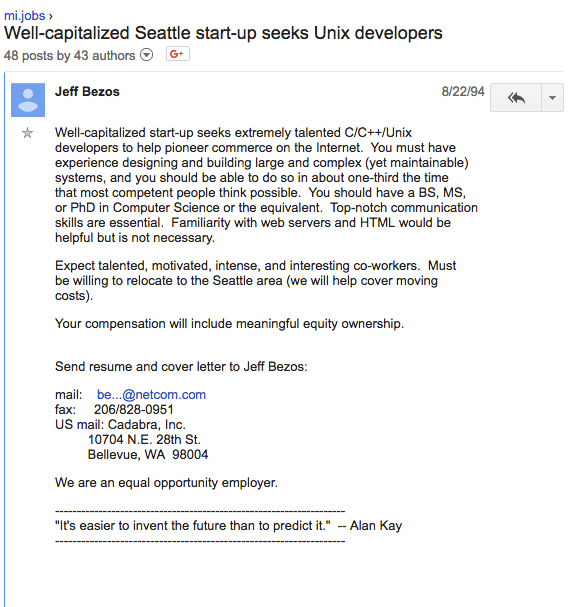Editor’s Note: I’m sharing my research on how to build better online communities by studying internet history. Join the mailing list and follow me on Twitter for more notes and app updates!
Part 1: The Next Great Online Community
Part 2: Usenet — Let’s Return to Public Spaces
Part 3: Slashdot vs Advogato - Reputation vs Trust in Social Software
Part 4: Make Your Company Slow and Wise
Part 5: The Brief Wondrous Life of Branch
Part 6: Yik Yak, Secret, and The Minimal State
Usenet was what the Web is missing nowadays: a genuinely public space, with unclear ownership…Compared to chat systems like IRC (and later, instant messaging and texting), Usenet encouraged thoughtful, long-form writing with lots of quotation and back-and-forth.
— PC Mag
Ah, Usenet.
Birthplace of emoticons, flame wars, trolling, terms like “spam” and acronyms like “lol” and “brb”. What happened?
To understand why it died, I can do no better than to point you to this Reddit post and this article.
In summary, Usenet was:
Ineffective at dealing with bad actors, trolls, spam, explicit/illegal content, spoofing, abuse, bots, brigading, etc.
Unable to maintain culture (aka “netiquette”) at scale
Missing a business model
Surpassed in ease-of-use by browser-based forums (didn’t need to be installed)
Despite it’s flaws, it was great in many ways:
Interface - UI made it easy to scan many posts quickly
User Experience - tracking seen/unseen posts made it feel more personal
Breadth - provided a meeting space for virtually any topic
Cross-Fertilization - members could jump between groups easily
Quality Discussions - lots of thoughtful, long-form writing
Decentralized / Shared Ownership - a genuinely public space no one “owned”
IMO, this last aspect is what made Usenet truly special.
The idea that no one was bigger than any given (news)group was baked directly into the software. Everyone held the keys to the castle.
Editor’s Note: To be fair, a very influential secret cabal of Usenet users did form at one point — but eventually disbanded.
Decentralization is often considered the only way to foster this kind of shared ownership, but history has shown it’s possible for centralized apps too.
A good example is Twitter hashtags (which I’ll consider independently from Twitter proper). Informal and often ephemeral, hashtag streams place everyone on a level playing field.
Unfortunately Twitter hashtags suffer from the same structural deficiency as Usenet newsgroups: unfettered anarchy collapses at scale.
It’s no surprise every sufficiently large subreddit, Facebook group, Slack chat, and Telegram group needs moderators or admins — someone’s got to keep the peace!
By accepting this bargain, we’re allowing our communal spaces to be transfomed into into digital fiefdoms. It’s now status quo to have a few people wielding de-facto, overlord privileges over huge, general interest groups.
This recipe leaves us vulnerable to the worst aspects of human nature and the bulging pockets of self-interested corporations.
Sadly, it seems we’ve given up on the idea of online communities as shared spaces — but studying Usenet is a great way to be reminded of what’s possible.
For more on how I plan to incorporate shared ownership into the community app I’m building, and more notes like this — subscribe and say hello.
I’ll leave you with a treat from the Usenet archives — Amazon’s (then known as Cadabra) first ever job posting on mi.jobs:
Spread love! ✌️





I've been digging into these problems for a while as well. You do need moderation for public discussion. You do also risk bad actors in public to private discussion interfaces (recruiters, predators you name it.) My work now focuses on metadata provided about each user in advance, so their reputation and experience dictates how much others can trust them before initiating conversation.
I think what we're missing is topic-based discussion, moreso than discussion between friends. On the contrary, some of my life's closest relationships were made via discussion boards. People tend to be more civil, as well.
I don't think usenet will be the place for it (antiquated tech, semi-anonymous, not super user-friendly, etc), but its the same general concept.